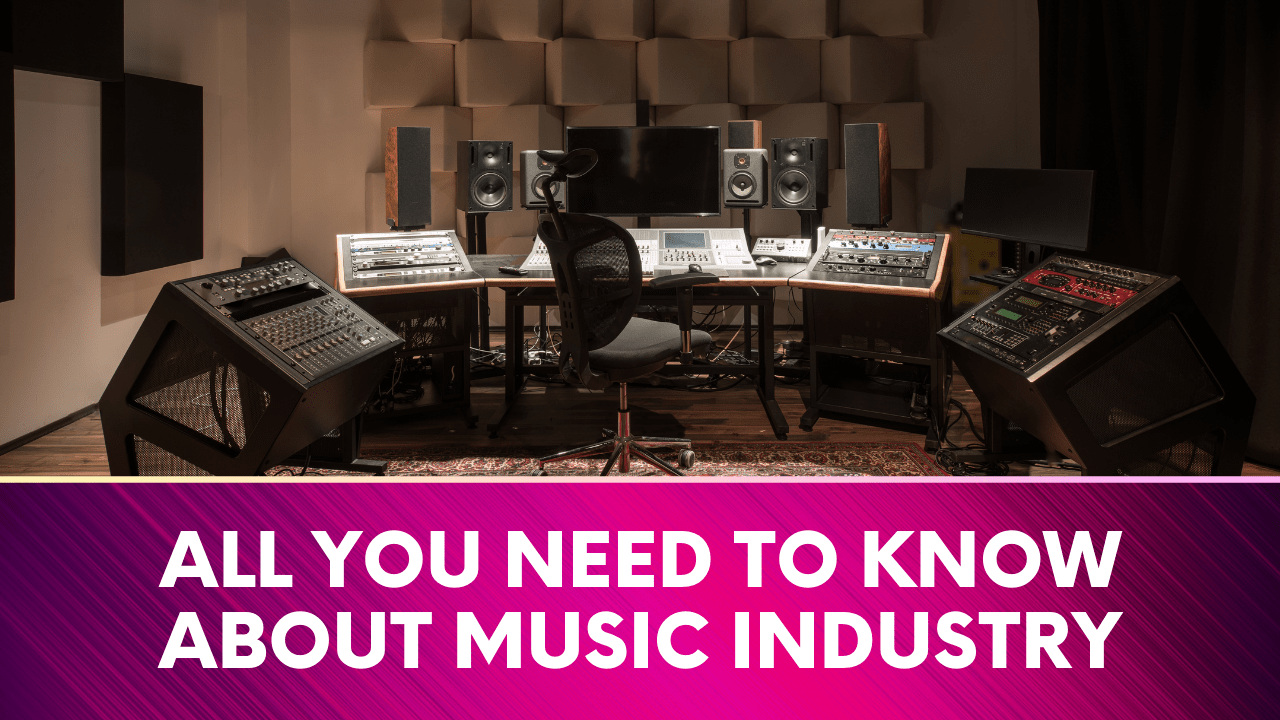The music industry is a vast and multifaceted domain, filled with opportunities and challenges alike. For anyone passionate about music, whether as a listener, an artist, or an industry professional, understanding how the industry works is crucial. This comprehensive guide will take you through all you need to know about the music industry, delving into its history, structure, key components, and the latest trends shaping its future. We’ll also explore the role of technology, social media, and distribution platforms in driving the industry forward, and how you can navigate these elements to build a successful career.
The Evolution of the Music Industry
The music industry has undergone a remarkable transformation over the last century. From the early days of live performances and sheet music sales to the current era dominated by digital streaming, the industry has constantly adapted to new technologies and consumer behaviors.
In the early 20th century, the music industry was centered around live performances and the sale of sheet music. Phonographs and radio broadcasts began to gain popularity, marking the start of recorded music’s commercial era. The advent of vinyl records in the 1940s and 1950s further revolutionized the industry, making music more accessible to the masses.
The 1980s and 1990s saw the rise of cassettes and CDs, which became the primary mediums for music consumption. However, the digital revolution at the turn of the millennium brought about the most significant change. The introduction of MP3s and peer-to-peer sharing platforms like Napster disrupted the traditional model, leading to a decline in physical sales and forcing the industry to rethink its business strategies.
With the rise of digital downloads and streaming services like iTunes, Spotify, and Apple Music, the music industry has entered a new era. These platforms have made music more accessible than ever before, allowing listeners to access vast libraries of songs at the touch of a button. This shift has also empowered artists, giving them more control over their music and how it is distributed.
Today, understanding all you need to know about the music industry requires recognizing this history of constant change and adaptation. The industry continues to evolve, with new technologies and trends shaping the way music is created, distributed, and consumed.
The Structure of the Music Industry
To fully grasp all you need to know about the music industry, it’s essential to understand its structure and the various entities that make up this complex ecosystem. The music industry is composed of several key players, each playing a crucial role in the production, distribution, and promotion of music.
a. Record Labels
Record labels have traditionally been the backbone of the music industry. They sign artists, finance the recording process, and handle the distribution and promotion of music. There are two main types of record labels: major labels and independent labels.
- Major Labels: These are large companies with extensive resources, such as Universal Music Group, Sony Music, and Warner Music Group. Major labels have the power to promote artists on a global scale, with vast networks for distribution and marketing.
- Independent Labels: Also known as indie labels, these are smaller companies that often provide more creative freedom to artists. While they may not have the same resources as major labels, indie labels are known for their niche focus and personalized approach to artist development.
b. Music Publishing
Music publishing is another critical component of the industry, focusing on the rights to musical compositions. Publishers work to ensure that songwriters and composers receive royalties when their music is used commercially. They handle licensing for various uses, including film, television, advertisements, and streaming.
The role of a music publisher includes promoting the music to potential buyers, negotiating licensing deals, and collecting royalties on behalf of the songwriters. This aspect of the industry is crucial for ensuring that creators are fairly compensated for their work.
c. Music Distribution
Music distribution is the process of getting music from the artist to the listener. In the past, this was achieved through physical sales of records, tapes, and CDs. Today, digital distribution is the primary method, with platforms like Deliver My Tune and TuneCore helping artists distribute their music to a global audience.
Digital distribution platforms play a vital role in the modern music industry. They allow artists to upload their music and distribute it to various streaming services, online stores, and social media platforms. This democratization of distribution has enabled independent artists to reach audiences without the need for a traditional record deal.
d. Streaming Services
Streaming services have revolutionized the way we consume music. Platforms like Spotify, Apple Music, and YouTube allow users to access millions of songs for a subscription fee or for free with advertisements. These services have become the primary source of revenue for many artists, with physical sales declining.
Streaming platforms also provide valuable data on listener behavior, which artists and record labels use to make informed decisions about marketing and touring. Understanding how to optimize your presence on these platforms is a key part of all you need to know about the music industry today.
e. Live Performance and Touring
Live performances and touring remain significant revenue streams for artists. While digital sales and streaming have transformed the industry, the demand for live music has continued to grow. Concerts, festivals, and tours provide artists with the opportunity to connect with their audience in person, build a loyal fan base, and generate substantial income.
In recent years, the live music sector has also embraced technology, with virtual concerts and live-streaming events becoming more popular. These digital experiences offer artists new ways to engage with fans and reach audiences who might not be able to attend physical events.
The Role of Technology in the Music Industry
Technology has been a driving force behind the evolution of the music industry. From the invention of the phonograph to the rise of digital streaming, technological advancements have continually reshaped how music is produced, distributed, and consumed.
a. Digital Recording and Production
The transition from analog to digital recording has democratized music production, making it accessible to a broader range of creators. Today, anyone with a computer and the right software can produce high-quality music from the comfort of their home. This shift has lowered the barriers to entry for new artists and increased the diversity of music available.
Digital audio workstations (DAWs) like Pro Tools, Logic Pro, and Ableton Live have become standard tools in the industry. These platforms allow producers and musicians to record, edit, and mix music with precision, enabling the creation of professional-grade recordings without the need for expensive studio time.
b. AI and Machine Learning
Artificial intelligence (AI) and machine learning are increasingly playing a role in the music industry. AI is being used in various applications, from composing music to mastering tracks. For instance, AI-powered mastering services like those offered by Deliver My Tune provide artists with a quick and affordable way to enhance their music’s sound quality.
Machine learning algorithms are also used by streaming platforms to analyze listener behavior and make personalized recommendations. This technology helps platforms like Spotify and Apple Music deliver tailored playlists and discover new music that aligns with users’ preferences.
c. Blockchain and NFTs
Blockchain technology is making inroads into the music industry, particularly in the areas of royalty distribution and copyright protection. Blockchain’s decentralized nature allows for transparent and secure transactions, making it easier to track and distribute royalties to artists and rights holders.
Non-fungible tokens (NFTs) have also gained popularity in the music industry as a new way for artists to monetize their work. NFTs allow artists to sell unique digital assets, such as exclusive tracks, artwork, or concert tickets, directly to their fans. This technology is still in its early stages but has the potential to revolutionize the way artists interact with their audience.
Social media has become an indispensable tool for music promotion in the digital age. Platforms like Instagram, Facebook, Twitter, and YouTube offer artists the ability to connect directly with their audience, share their work, and build a personal brand.
Effective use of social media requires more than just posting content; it involves strategic planning, audience engagement, and analytics. Many artists use social media management services to help them navigate this complex landscape. These services can assist with content creation, scheduling, and monitoring, ensuring that artists maintain a strong and consistent online presence【8†source】.
In today’s music industry, social media is one of the most powerful tools for promotion and fan engagement. Understanding how to leverage these platforms is crucial for anyone looking to succeed in the industry.
a. Building an Online Presence
Building a strong online presence is the first step in using social media effectively. This involves creating profiles on key platforms like Instagram, Facebook, and YouTube, and regularly updating them with content that reflects your brand as an artist.
Content creation is at the heart of social media marketing. Whether it’s posting behind-the-scenes videos on Instagram Stories, sharing music videos on YouTube, or tweeting about upcoming gigs, artists need to consistently produce content that engages their audience. High-quality visuals, compelling stories, and regular interaction with fans are key components of a successful social media strategy.
b. Engaging with Your Audience
Audience engagement is another critical aspect of social media promotion. It’s not enough to simply post content; artists must actively interact with their followers. This can include responding to comments, hosting live Q&A sessions, and encouraging fan participation through contests or challenges.
Engaging with your audience helps build a loyal fan base, which is essential for long-term success in the music industry. Fans who feel a personal connection with an artist are more likely to support their work, attend concerts, and share their music with others.
c. Utilizing Paid Advertising
While organic reach is important, paid advertising on social media can significantly boost visibility and help artists reach a broader audience. Platforms like Facebook and Instagram offer targeted advertising options that allow artists to reach specific demographics based on factors like age, location, and interests.
Paid ads can be used to promote new releases, announce tour dates, or drive traffic to an artist’s website or streaming profiles. When done correctly, social media advertising can provide a substantial return on investment, increasing both fan engagement and revenue.
d. Collaborations and Influencer Marketing
Collaborations and influencer marketing are effective strategies for expanding your reach on social media. Partnering with other artists, influencers, or brands can introduce your music to new audiences and create buzz around your work.
Influencers with large followings can help promote your music to their audience, lending credibility and increasing exposure. Collaborating with other artists, whether through joint projects or social media takeovers, can also attract new fans and provide fresh content for your profiles.
Trends Shaping the Future of the Music Industry
The music industry is constantly evolving, with new trends emerging that shape how music is created, distributed, and consumed. Staying informed about these trends is essential for anyone looking to succeed in the industry.
a. The Rise of Independent Artists
One of the most significant trends in the music industry is the rise of independent artists. With the advent of digital distribution platforms and social media, artists no longer need to rely on major record labels to reach a global audience. Independent distribution platforms like Deliver My Tune provide artists with the tools they need to release their music independently and retain control over their careers【9†source】.
The independent music scene has grown rapidly in recent years, with more artists choosing to go the indie route. This shift has led to a more diverse music landscape, with a wider variety of genres and styles reaching listeners worldwide. The success of independent artists like Chance the Rapper and Billie Eilish has further demonstrated that it’s possible to achieve mainstream success without the backing of a major label.
b. The Continued Growth of Streaming
Streaming has become the dominant mode of music consumption, with platforms like Spotify and Apple Music leading the charge. As streaming continues to grow, it’s essential for artists to optimize their presence on these platforms. This includes getting verified profiles, creating engaging playlists, and utilizing features like Spotify’s Countdown Pages to build anticipation for new releases.
In addition to traditional streaming services, there has been a rise in niche platforms that cater to specific genres or communities. These platforms offer unique opportunities for artists to connect with targeted audiences and build a dedicated fan base.
c. Virtual and Augmented Reality
They are making inroads into the music industry, offering new ways for artists to interact with their audience. Virtual concerts, for example, have become increasingly popular, especially in the wake of the COVID-19 pandemic. These events allow fans to experience live performances from the comfort of their homes, with immersive technology enhancing the experience.
AR technology is also being used to create interactive music videos and album covers, providing fans with a more engaging way to experience music. As VR and AR technology becomes more accessible, it’s likely to become an integral part of the music experience, offering artists new creative opportunities.
d. Sustainability and Ethical Practices
As awareness of environmental and ethical issues grows, the music industry is seeing a shift towards more sustainable and ethical practices. This includes everything from eco-friendly touring and production to fairer compensation models for artists.
Sustainable touring practices, such as reducing carbon footprints and minimizing waste, are becoming more common among artists who want to make a positive impact on the environment. Additionally, there’s a growing movement towards fair trade music, which advocates for fair compensation and ethical treatment of artists and workers in the industry.
Challenges Facing the Music Industry
While the music industry offers many opportunities, it also presents several challenges that artists and professionals need to navigate. Understanding these challenges is crucial for anyone looking to succeed in the industry.
a. Copyright and Intellectual Property Issues
Copyright and intellectual property issues remain significant challenges in the music industry. With the ease of sharing music online, artists must be vigilant about protecting their work. Proper licensing, registration, and understanding copyright law are essential to avoid legal disputes and ensure that artists receive fair compensation for their work.
The rise of digital sampling and remix culture has also complicated copyright issues, as determining ownership and rights can be challenging. Artists and producers must navigate these complexities to avoid infringement and ensure their work is legally protected.
b. Revenue Distribution
Revenue distribution in the music industry is often a point of contention, particularly with the rise of streaming. While streaming services provide access to millions of listeners, the revenue per stream is relatively low, leading to debates about the fairness of streaming payouts.
Artists and rights holders must be proactive in understanding how revenue is generated and distributed, and explore alternative income streams to supplement their earnings. This includes merchandise sales, live performances, licensing deals, and direct fan support through platforms like Patreon.
c. Market Saturation
The music industry has become highly saturated, with more artists and music being released than ever before. Standing out in this crowded market requires not only talent but also effective marketing, branding, and networking.
Artists must be strategic in how they promote their music and build their brand, leveraging social media, digital marketing, and collaborations to reach new audiences. This also means being adaptable and staying ahead of industry trends to remain relevant.
Opportunities in the Music Industry
Despite the challenges, there are numerous opportunities for those looking to succeed in the music industry. By leveraging the right tools, technologies, and strategies, artists and professionals can build successful careers and make a lasting impact.
a. Collaboration and Networking
Collaboration and networking are powerful tools for growth in the music industry. Whether it’s working with other artists, producers, or brands, collaboration can open up new audiences and create unique opportunities.
Networking with industry professionals, attending music conferences, and engaging with fans online are essential for building relationships and expanding your reach. The music industry is a relationship-driven business, and building a strong network can lead to valuable partnerships and career opportunities.
b. Licensing and Sync Deals
Licensing your music for use in films, TV shows, commercials, and video games can be a lucrative source of income. Sync deals not only provide financial benefits but also increase exposure and can introduce your music to new audiences.
Working with music supervisors and licensing agencies can help artists navigate the complex world of sync deals and ensure their music is placed in the right projects. As demand for original music in media continues to grow, sync licensing remains a valuable opportunity for artists.
c. Diversifying Income Streams
In today’s music industry, relying solely on album sales is no longer viable. Artists need to diversify their income streams through live performances, merchandise, crowdfunding, and direct fan support through platforms like Patreon. This approach ensures a more stable and sustainable career.
Merchandise sales, in particular, have become a significant revenue stream for many artists. Offering unique, limited-edition products that resonate with fans can boost income and strengthen the artist-fan relationship. Crowdfunding platforms like Kickstarter and Patreon also provide artists with the means to fund projects directly through fan support.
The Role of Music Distribution Services
Music distribution services are crucial for getting your music heard by a global audience. They bridge the gap between artists and streaming platforms, ensuring that your music is available everywhere your fans are.
a. Digital Distribution Platforms
Digital distribution platforms like Deliver My Tune, TuneCore, and DistroKid have revolutionized the way music is released and distributed. These platforms allow artists to upload their music and distribute it across various streaming services, online stores, and social media platforms.
The benefits of using digital distribution platforms include access to a global audience, detailed analytics, and the ability to retain control over your music. These services often include additional features like playlist pitching, royalty collection, and profile verification, all of which are essential for building a successful music career.
b. The Benefits of Professional Distribution
Professional distribution services offer several advantages, including wider reach, detailed analytics, and marketing support. They also provide artists with the tools needed to track their music’s performance and optimize their release strategy.
One of the key benefits of professional distribution is access to editorial playlists on streaming platforms. These playlists can significantly boost an artist’s visibility and streams, leading to increased revenue and fan engagement. Additionally, professional distribution services often offer support for physical releases, such as vinyl and CDs, for artists who want to reach audiences beyond digital platforms.
Building a Successful Career in the Music Industry
Building a successful career in the music industry requires more than just talent. It involves a strategic approach to marketing, networking, financial management, and continuous learning.
a. Developing Your Personal Brand
Your personal brand is what sets you apart in the music industry. It’s how you present yourself to the world, from your music and image to your online presence. Building a strong brand requires consistency, authenticity, and a deep understanding of your target audience.
To develop a personal brand, artists should focus on creating a unique visual identity, defining their sound, and consistently communicating their values and message. A well-defined brand helps attract the right audience, create a loyal fan base, and open doors to new opportunities.
b. Financial Management
Understanding the financial aspects of your career is crucial for long-term success. This includes managing royalties, budgeting for production and promotion, and understanding the financial implications of distribution deals. Many artists choose to work with financial advisors or managers to ensure their finances are handled properly.
Proper financial management allows artists to invest in their careers, from funding new projects to marketing their music effectively. It also ensures that artists can sustain their careers over the long term, even during periods when income may fluctuate.
c. Continuous Learning and Adaptation
The music industry is constantly evolving, and artists must be willing to learn and adapt to stay relevant. This includes staying informed about industry trends, learning new skills, and being open to experimenting with different genres, styles, and marketing strategies.
Continuous learning can involve taking courses in music production, digital marketing, or business management, as well as seeking mentorship from industry professionals. By staying curious and adaptable, artists can navigate the challenges of the industry and seize new opportunities as they arise.
The Future of the Music Industry
The future of the music industry is both exciting and unpredictable. As technology continues to advance, new opportunities and challenges will emerge. Staying informed and adaptable is key to thriving in this ever-changing industry.
a. The Evolution of Streaming
Streaming is likely to remain the dominant mode of music consumption, but the landscape may continue to evolve. New models may emerge that better compensate artists, and niche platforms catering to specific genres or communities may gain prominence.
Additionally, advancements in streaming technology could lead to more personalized and immersive listening experiences, with AI-driven recommendations and interactive features becoming more sophisticated.
b. The Rise of AI and Automation
AI and automation will continue to play a significant role in the music industry, from production to marketing. Embracing these technologies can give artists a competitive edge, allowing them to create, distribute, and promote their music more efficiently.
As AI technology advances, we may see more applications in areas like songwriting, arrangement, and even live performance. Artists who leverage AI tools effectively can enhance their creativity and streamline their workflow, allowing them to focus on what they do best: making music.
c. Sustainability and Ethical Practices
As awareness of environmental and ethical issues grows, the music industry will likely see a shift towards more sustainable and ethical practices. This could include everything from eco-friendly touring and production to fairer compensation models for artists.
The demand for transparency and accountability is increasing, with fans and industry professionals alike calling for more ethical practices in all aspects of the music business. Artists who prioritize sustainability and ethics in their work may find that they resonate more deeply with their audience and stand out in a crowded market.
Conclusion
In conclusion, all you need to know about the music industry is that it is a complex, dynamic, and ever-evolving field. By understanding its history, key components, challenges, and opportunities, you can navigate this industry successfully and build a thriving career. Whether you’re an artist, a producer, or simply a music enthusiast, staying informed and adaptable will help you stay ahead in this exciting industry.
For further reading, explore these related articles:
- How to Maximize Your Reach with Free Video Distribution Services
- Best Music Industry Books: Essential Reads for Musicians and Enthusiasts
- The Dark Side of the Music Industry: Unveiling the Hidden Realities
For additional resources on music marketing and distribution, visit Deliver My Tune.






